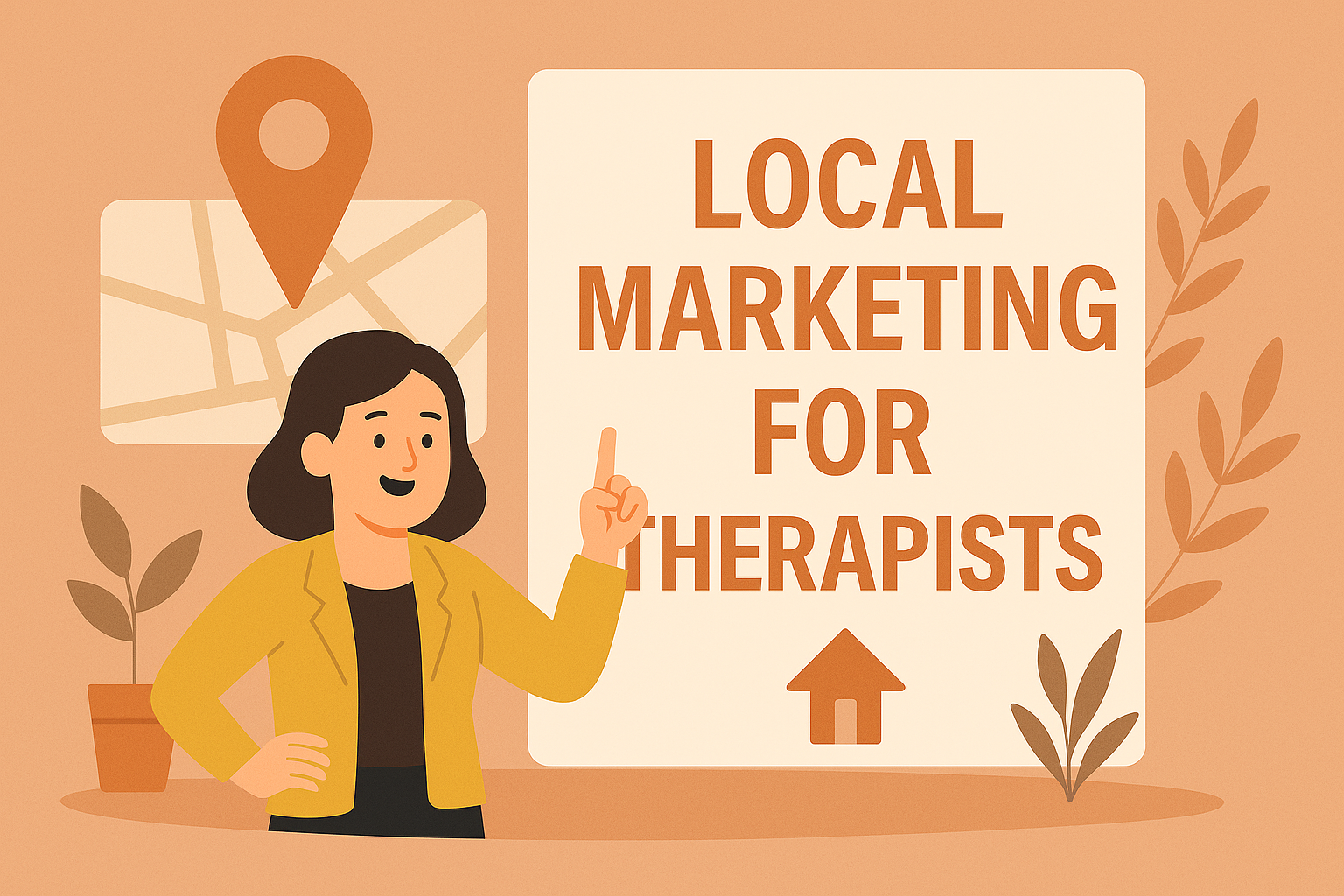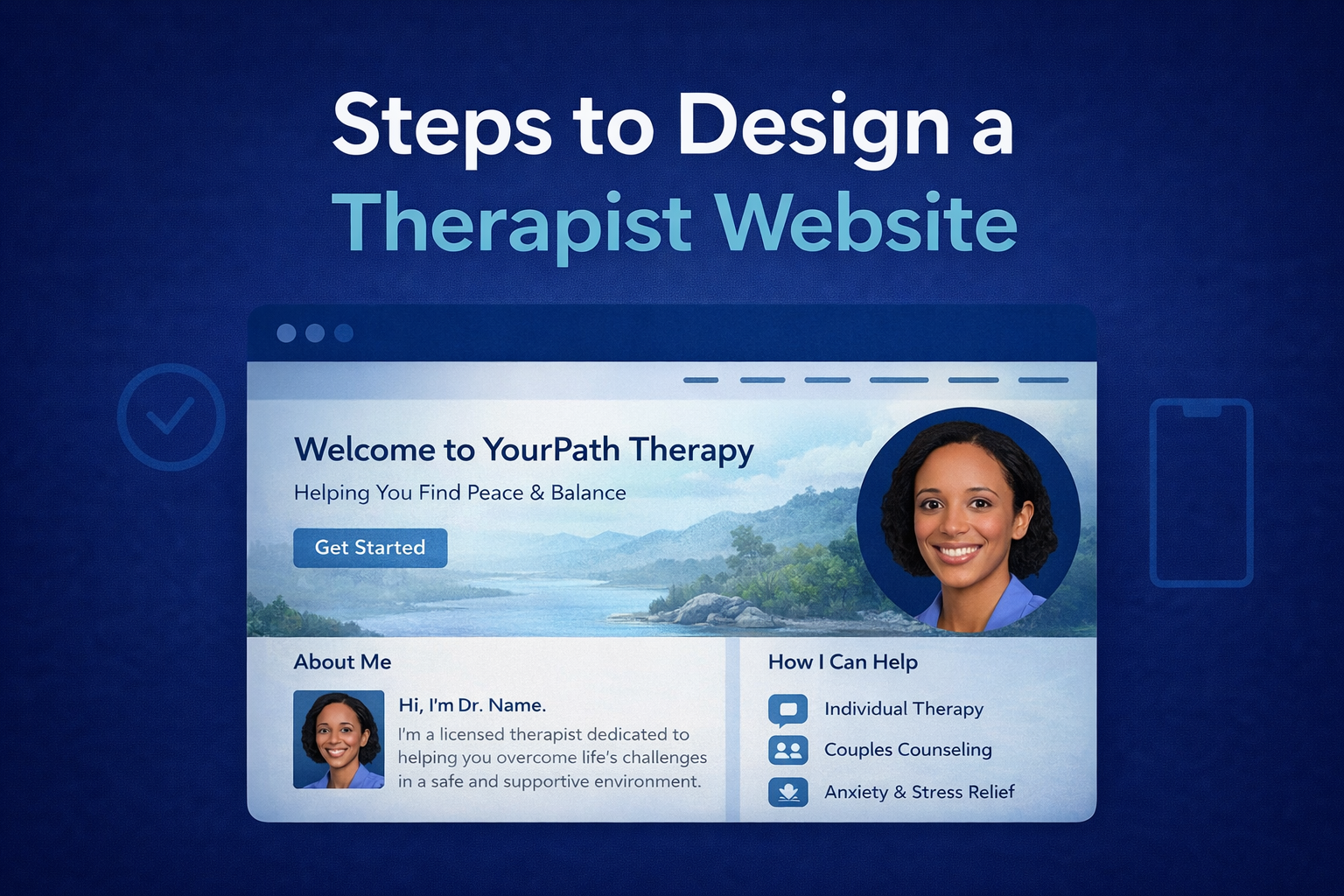Local marketing for therapists has become a critical growth driver for private practices. When clients search “therapist near me” or “counseling in [city/state],” your local presence determines how many inquiries you receive. In today’s digital landscape, building strong community visibility is just as important as offering excellent care.
Local marketing isn’t just about online presence; it’s about becoming a trusted name in your community. With the rise of Google Maps searches, location-based keywords, and client reviews, your online reputation now directly influences booking decisions.
This guide explores proven local marketing strategies for therapists, from optimizing your Google Business Profile and mastering local SEO to leveraging directories, community engagement, and offline outreach. By the end, you’ll have a clear roadmap to strengthen your presence both online and within your community.
Why Local Marketing Is Essential for Therapists
Local marketing helps bridge the gap between a potential client’s online search and the comfort of finding a therapist nearby. Research shows most therapy clients prefer local providers for convenience, familiarity, and emotional comfort.
Unlike general digital marketing, local marketing focuses on proximity and trust. When a therapist appears in Google Maps with positive reviews, clients are more likely to reach out.
Key benefits include:
- Higher visibility for “near me” and city-based searches.
- Improved credibility through reviews and verified business profiles.
- Community trust — clients feel more confident engaging with local professionals.
Example: A therapist in Los Angeles increased inquiries by 120% after optimizing their Google Business Profile and earning 25+ five-star reviews.
Learn more about the importance of marketing for therapy practices.
Understanding How Clients Find Therapists Locally
The modern client journey begins online, long before a call or appointment is made. Google calls this the “Zero Moment of Truth,” when potential clients research before making a decision.
Common discovery channels:
- Google Search & Maps: “therapist near me” is one of the top-searched phrases.
- Directories: Psychology Today, TherapyDen, and GoodTherapy dominate local searches.
- Social Media: Instagram, Facebook, and LinkedIn allow professionals to build local familiarity.
- Reviews: Authentic testimonials influence conversions as much as professional credentials.
Your visibility across these touchpoints shapes client perception — and consistent branding ensures that whether clients find you via Google, a directory, or social media, your practice message stays aligned.
Optimizing Your Google Business Profile (GBP)
Google Business Profile (GBP) is your free but powerful local marketing tool. An optimized GBP can be the difference between showing up on page one or being invisible to local clients.
Steps to optimize your GBP:
- Claim & Verify Your Profile: Visit Google Business to claim your listing and verify ownership.
- Write an Optimized Business Description: Use phrases like “Therapist in [City]” or “Anxiety Counselor in [State].”
- Add Services & Categories: Include all specialties (e.g., depression therapy, marriage counseling).
- Upload Photos & Videos: Showcase your office, therapy room, and team to create an emotional connection.
- Collect & Manage Reviews: Encourage clients to share authentic feedback; respond to each review professionally.
- Monitor Analytics: GBP Insights reveal where your profile views and calls are coming from.
Explore how therapists can improve their visibility through SEO and optimization techniques.
Local SEO for Therapists: Ranking in “Therapist Near Me” Searches
Local SEO determines whether your practice appears when clients search for therapy services nearby. It focuses on geographic relevance, accurate business data, and on-page optimization.
Key strategies:
- Geo-targeted Keywords: Use terms like “Therapist in Austin,” “Counseling in Virginia Beach,” or “Psychologist in San Diego.”
- On-Page SEO: Optimize titles, meta descriptions, H1s, and schema markup for clarity.
- Local Citations: Ensure consistent NAP (Name, Address, Phone) data across platforms.
- Backlinks: Earn links from local blogs, wellness networks, or community organizations.
- Mobile Optimization: Over 70% of local therapy searches happen on mobile devices.
Read our full guide on Local SEO for Mental Health Therapists.
Building Local Authority with Directories and Listings
Directories remain one of the most effective and reliable tools for building authority. Sites like Psychology Today, TherapyTribe, and GoodTherapy often rank at the top of local searches, meaning your listing helps you appear twice in Google results.
Directory optimization checklist:
- Complete your profile with a professional photo, detailed bio, and specialties.
- Maintain NAP consistency across every listing.
- Add links to your website and social media profiles.
- Request client reviews and ratings where allowed.
- Keep profiles updated regularly with new services or certifications.
Here’s how digital marketing agencies help therapists improve directory visibility.
Leveraging Local Content and Community Marketing
Beyond SEO, authentic community connection sets you apart. Localized content allows you to show empathy, expertise, and involvement in your area.
Ideas for community-driven marketing:
- Blog about local topics: e.g., “Mental Health Resources in Chicago” or “Therapy Options in Austin.”
- Collaborate with local professionals: Partner with wellness centers, yoga studios, or nutritionists.
- Host events or workshops: Offer free webinars or community mental health sessions.
- Feature in regional media: Contribute articles to local magazines or news sites.
- Promote volunteer work: Highlight participation in community awareness campaigns.
Explore how to build an engaging online presence for mental health services.
Social Media and Local Visibility
Social media can amplify your local voice if used strategically. Instead of generic posts, focus on community-centric storytelling.
Tips for local social engagement:
- Use location-based hashtags (#SeattleTherapist, #DallasCounseling).
- Tag your city or neighborhood in each post.
- Create short Reels or YouTube Shorts addressing mental health topics relevant to your city.
- Engage in Facebook or Nextdoor groups to answer local mental health questions.
- Share client success stories (anonymously or with consent) highlighting your area.
Learn social media marketing strategies tailored for mental health professionals.
Paid Local Advertising for Therapists
Paid local ads offer instant visibility for therapists targeting a specific radius or ZIP code. They complement organic efforts by placing your practice directly in front of active searchers.
Smart advertising options:
- Google Local Service Ads (LSAs): Appear at the top of Google results with “Google Screened” verification.
- Google Ads (Search Campaigns): Target terms like “Couples Therapist near me.”
- Facebook & Instagram Ads: Promote free consultations or educational webinars.
- Retargeting Ads: Re-engage users who visited your website but didn’t book.
Always track metrics — clicks, conversions, and cost per lead — to fine-tune performance.
Offline Local Marketing That Still Works
Even in 2025, offline methods remain effective when integrated with digital strategies.
Tried-and-true tactics:
- Networking: Connect with local physicians, psychiatrists, and wellness professionals.
- Speaking Engagements: Offer sessions at community centers or universities.
- Local Sponsorships: Support mental health walks, charity runs, or awareness drives.
- Print Materials: Place brochures at clinics, cafés, or libraries with QR codes linking to your website.
Offline efforts build familiarity, and when supported by online visibility, they create a powerful 360-degree brand presence.
Tracking Success and Measuring Local Marketing ROI
Tracking is crucial to identify what’s working and where to invest more resources.
Use these tools:
- Google Analytics: Track local traffic, call clicks, and conversions.
- Google Business Insights: See how many clients found you via Maps or Search.
- Call Tracking Tools: Attribute leads to campaigns accurately.
Monitor key metrics:
- Organic traffic growth from local keywords
- Inquiries via Google Business
- Review volume and average rating trends
Refine campaigns monthly, keep improving top-performing areas and adjust where needed.
Common Local Marketing Mistakes Therapists Should Avoid
Many therapists unknowingly limit their reach by skipping basic best practices.
Avoid these pitfalls:
- Inconsistent business information (different phone or address).
- Ignoring online reviews or negative feedback.
- Poor mobile performance on the website.
- Overlooking Google Maps visibility.
- Duplicate directory content across platforms.
Fixing these errors can immediately boost your local rankings and credibility.
How MHIS Supports Local Marketing for Therapists
At Mental Health IT Solutions (MHIS), we specialize in helping therapists, psychologists, and counselors build strong, credible local presences.
Our services include:
- Local SEO Optimization: Ensuring your website ranks for city-based searches.
- Google Business Profile Management: Professional setup and ongoing optimization.
- Directory & Citation Strategy: Consistent listings on Psychology Today, TherapyDen, and more.
- Content Marketing & Advertising: Geo-targeted blog creation and paid campaigns.
Discover how MHIS helps mental health professionals grow their practice.
Ready to attract more local clients and stand out in your community?
Get a Personalized Local Marketing Strategy for Your Practice →







